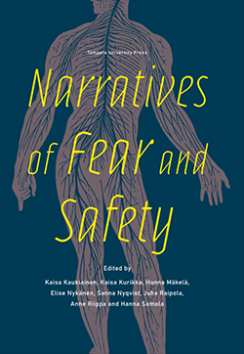Narratives of Fear and Safety

Downloads
Keywords:
comparative literature, fiction, affects, traumas, dystopias, catastrophes, ecocriticism, cinema, comics, literature, topics, narrativesSynopsis
The essays in this edited volume, written in English and French, tackle the intriguing problems of fear and safety by analysing their various meanings and manifestations in literature and other narrative media. The articles bring forth new, cross-cultural interpretations on fear and safety through examining what kinds of genre-specific means of world-making narratives use to express these two affectivities. The articles also show how important it is to study these themes in order to understand challenges in times of global threats, such as the climate crisis.
The main themes of the book are approached from various theoretical perspectives as related to their literary and cultural representations. Recent trends in research, such as affect and risk theory, serve as the basis for the discussion. Many of the articles in the volume discuss apocalyptic and dystopian narratives that currently permeate the entire cultural landscape. Dystopian narratives do not only deal with future threats, such as totalitarianism, technocracy, or environmental disasters, but also suggest alternative ways of being and new hopes in the form of political resistance.
The articles in the volume also draw from disciplines such as gender studies and trauma studies to examine the threats posed by collective fears and aggression on individuals’ lives and propose ways of coping with fear. These themes are addressed also in articles analysing new adaptations of old myths that retell stories of the past.
Available in print from online bookstores e.g. Booky.fi and Adlibris.
Contents
Introduction: Affective spaces in European literature and other narrative media / Elise Nykänen & Hanna Samola
I. Cultural politics of fear and safety
- L’oeuvre, la peur et le temps : Pour une saisie du risque par la littérature / Anne Duprat
- Knocking on Europe’s door: How narratives of fear, insecurity and nostalgia shape collective perceptions of immigration / Anna Notaro
- Pro loco et tempore : La littérature portugaise a l’épicentre de la crise économique / Serafina Martins
II. Fear and safety across genres
- “We have to fix this world now”: Hope, utopianism, and new modes of political agency in two contemporary Finnish young adult dystopias / Maria Laakso
- La sécurité ou l’exacerbation des peurs au profit d’une liberté provisoire / Orlane Glises De La Riviere
- Mind the gap: Fear on the London Underground / Cristiana Pugliese
- Peur du chaos et retour a l’humain : Le mythe du yéti selon Hergé et Castelli-Manara / Brigitte Le Juez
III. Cultural and transcultural perspectives on fear and safety
- Fear of unjust memory or desire for secure identity? Remembering the era of 1989 transition in contemporary Polish novel / Olga Szmidt
- Fear of the Other: Representations of Otherness in Irish and Ukrainian famine fictions / Tatiana Krol
- The fear of cultural belonging: Sharon Dodua Otoo’s transnational writing / Nora Moll
- Fear and safety in contemporary Russian cinema: A transcultural perspective / Beata Waligórska-Olejniczak
- Divakaruni’s Before We Visit the Goddess: Overcoming fears and instabilities / Metka Zupančič
IV. Coping with fear
- Post-traumatic stress disorder (PTSD) as posthumanity in graphic narratives / Lisa DeTora
- Of murdered babies and silenced histories: Gendering memory in two francophone trauma narratives / Nathalie Ségeral
- Peur et humour : Le cas de l’humour noir / Jean-Marc Moura
- L’Autre dans la fiction post-apocalyptique du XXI siecle / Jasmin Hammon
V. The End of the world? From cultural ecologies to ecological disasters
- Michel Deguy’s l’etre-comme and the poetics of ecological comparativism / Sam La Védrine
- Sans dessus dessous (1889) de Jules Verne : Dernier avertissement avant l’Apocalypse / Laure Léveque
- Le Japon de Fukushima comme lieu de discours pour des auteurs francophones / Sabine Kraenker
- L’invention de la catastrophe au XVIII siecle : Une invention renouvelée a la croisée de la littérature, de l’histoire des sociétés et de l’histoire environnementale / Sandra Contamina

Downloads
Published
Categories
License

This work is licensed under a Creative Commons Attribution-NonCommercial-NoDerivatives 4.0 International License.







